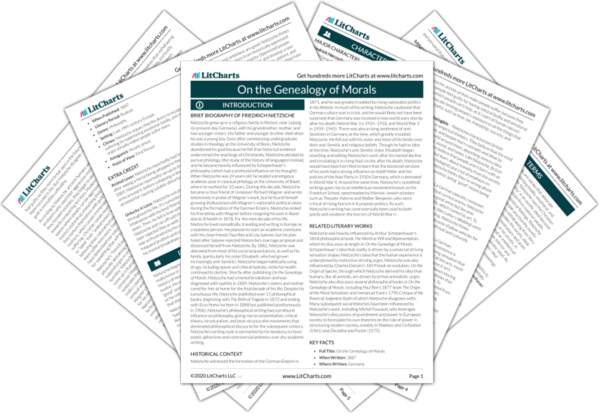Good and Evil
Nietzsche explores the historical and cultural origins of moral ideas—like “good,” “bad,” and “evil”—in his On the Genealogy of Morals. Nietzsche argues that although most modern Europeans assume that being kind, compassionate, patient, and gentle are fundamentally “good,” while being violent, cruel, and craving power are fundamentally “evil,” this is a relatively recent idea. Ancient Greek and Roman cultures, for instance, recognized that aggression is part of human nature, and they consequently embodied a…
read analysis of Good and EvilThe Repression of Human Nature
In On the Genealogy of Morality, Nietzsche argues that Christian values have corrupted European society and triggered a regressive cultural crisis in late 19th-century Europe. Nietzsche believes that humans are innate predators, but modern European society doesn’t offer a healthy outlet for people’s violent predatory instincts—essentially, human beings’ primal need to feel the satisfaction of exerting power over their prey. To Nietzsche, the “ascetic” ideology of Judeo-Christian doctrine—centering on “poverty, chastity, and…
read analysis of The Repression of Human NatureArt, Beauty, and Emotions
Nietzsche explores the relationship between art and emotional stimulation in his On the Genealogy of Morals. Many philosophers, like Kant, argue that recognizing beauty in art is only possible when humans maintain emotional distance from the art that we look at. Some philosophers, like Schopenhauer, even argue that the calm contemplation of beauty is the only mental space where humans can feel relief and solace from our relentless drive to constantly act…
read analysis of Art, Beauty, and Emotions







